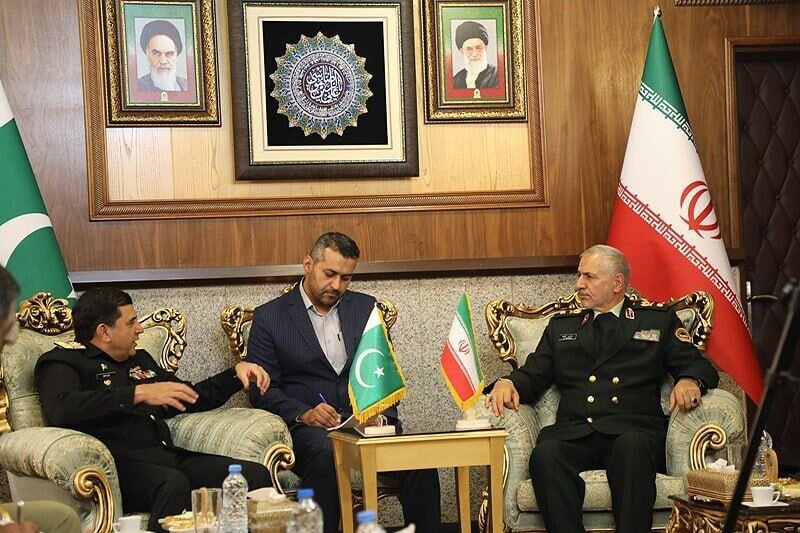Tehran, Islamabad discuss enhancing security along borders

TEHRAN – Iran and Pakistan stressed the need to boost security along borders in a bid to promote relations and improve coordination between the two neighboring countries.
The Islamic Republic of Iran fights hard against drug smugglers and prevents them from entering the region, the commander of the Iranian border guards has said.
"We are pleased to hold the second joint border meeting of Iran and Pakistan since it affects the two countries' relations, " IRNA quoted Brigadier General Ahmad-Ali Goudarzi as saying.
He made the remarks in a meeting with Rear Admiral Imtiaz Ali, the director general of the Pakistan Maritime Security Agency (PMSA).
The Iranian official said former joint meetings have had a significant impact on border security relations. “These meetings should continue to be held with the focus on improving maritime security and fighting drug trafficking, as the main objectives.”
The two countries share about 740 km and 204 km of land and sea borders, respectively. The stable security of the borders shows the good neighborly relations between Iran and Pakistan, Goudarzi noted.
Highlighting that the security of the Persian Gulf and the Oman Sea are of great importance to the regional countries, Goudarzi said over four thousand people have been martyred and some 12 thousand wounded in the fight against drug smuggling.
He went on to say that so far Iran has discovered more than 500 tons of narcotics in the current Iranian calendar year (started March 21). Over 15 tons of narcotic drugs have been discovered in the Sea of Oman.
To prevent drug trafficking, and illegal fishing, and ensure the safety of fishermen in the sea, the control of the sea borders should be enhanced by the two countries; joint patrols and maneuvers should be held, too, Goudarzi said.
Imtiaz Ali, for his part, said, "Fortunately, the sea borders of the two countries are calm and this is the result of coordination and understanding between the two countries.
Emphasizing the need to increase cooperation toward the management of sea borders, he said the Persian Gulf is of vital importance to the world that needs security. “So, we must secure stability in the region so that people can have a better life.”
Drug trafficking constitutes an important problem for Pakistan. “Our country is strongly against it and strictly deals with those engaged in drug smuggling,” he added.
Triangular Initiative
On June 14, senior officials from Iran and Pakistan started a two-day meeting in Tehran to deepen counter-narcotics cooperation under the framework of the United Nations Office on Drugs and Crime (UNODC)-brokered Triangular Initiative.
The meeting was part of the series of gatherings foreseen by the Triangular Initiative and aimed at discussing existing drug trafficking threats, regional counter-narcotic strategies, and operational means to improve trilateral cooperation, according to the UNODC website.
The Triangular Initiative was launched in 2007 to strengthen cooperation in counter-narcotics law enforcement between the Islamic Republics of Iran, Afghanistan, and Pakistan.
UNODC serves as its Secretariat; it facilitates the implementation of technical assistance and mobilizes financial support.
The initiative has so far helped to forge an unprecedented level of cooperation on drug control between the three countries.
Periodic meetings of experts and policy-makers have been facilitated by UNODC since 2007, building trust amongst the three countries' anti-narcotics authorities.
At the operational level, a Joint Planning Cell has been established in Tehran for information and intelligence sharing and the implementation of joint operations targeting drug trafficking networks operating in the region.
The front line
Iran is known as the first station and the front line of dealing with all kinds of drugs due to its location on the European transit route of Afghan drugs.
The fight against narcotics is very expensive due to the complexity of the mafia level of this business, a cost that the Islamic Republic of Iran has been paying alone for years despite the support claims of the international community.
On average, more than 90 percent of opium discoveries, 27 percent of heroin discoveries, and 59 percent of morphine discoveries in the world are made by Iran, Mohsen Naziri Asl, Iran’s permanent representative to the United Nations in Vienna, has said.
some 716 tons of narcotics were discovered and seized in the past Iranian calendar year (March 2022-March 2023), he added.
The flow of narcotics into Iran has decreased by about 15 percent over the past four years, Eskandar Momeni, the secretary general of the anti-narcotics headquarters, has said.
MT/MG
